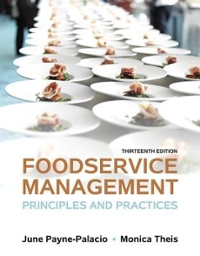Question
Based on the readings so far, you should be able to easily answer all three elements of this essay--the most relevant and prominent organization theories
Based on the readings so far, you should be able to easily answer all three elements of this essay--the most relevant and prominent organization theories we have covered so far: Organization Theory, Bureaucracy and Public Management in a time of major transformational changes." Give answers to the following in the order that is given below:
1. What are the key dominant theories? Spread the coverage to all we have covered, but consider which ones have dominated the fields of OT/OB and PA the last 3-4 decades.
2. What does bureaucracy mean and do? Be clear and substantive....don't leave any main/required stone unturned.
3. How does it --the Bureaucracy--work and doesn't work and why, what changes have been taken place the last 30 plus years, and what is prescribed as part of the new changes, as solutions, or alternatives to Bureaucracy? Be specific with citations.
4. Have changes been working, causing problems, and what solutions do you offer?
Readings to be used to answer the above questions Farazmand- 2002-Administrative ethics.pdf
Farazmand-Chap-53-Ethics and Professionalism.pdf
Waldo 1961 PAR--The Elephantine Problem.pdf
Weber-Bureaucracy.pdf
Readings to be used to answer the above questions
- Public Organization Review, Vol. 10 (3)/September issue (2010); the entire Issue has several articles authored by Peters, Farazmand, and others (choose any two articles of your choice from this symposium issue and read them very carefully;)
- Farazmand (2010). "Bureaucracy and Democracy: A Theoretical Analysis," Public Organization Review, 10 (3): 245-258).
- Waldo, Bureaucracy and Democracy: Reconciling Irreconcilability? The Enterprise of PA, Chap. 6. (1980, 1992).
- Marx on Bureaucracy, The Spirit of Bureaucracy, and Beyond Bureaucracy and more on his Collected Works
- Farazmand, Preface, Chap. 1
- Rainey, Chapters 1, 3
- Public Organization Review: a Global Journal, Vol. 1 (1), entire, especially the article by Roger Wettenhall on Public and Private Management.
- Rainey, Backoff, and Levine. 1976. "Comparing Public and Private Organizations," Public Administration Review, March/April: 233-244;
- Farazmand, Ali. 1999. "Globalization and Public Administration," Public Administration Review.59 (6): 509-522
- Waldo (1978). "Organization Theory: Revisiting the Elephant," Public Administration Review. 38: 589-597
- Farazmand, chapter 4
- Farazmand, Chaos and Transformation Theories: Implications for Public Management, Public Organization Review 3 (4): 339-372.
- Farazmand, The Elite Question: Toward a Normative Elite Theory of Organization, Administration & Society, Vol. 31 (3)/July, 1999: 321-360. *This article is also reprinted in Chapter 4 of your textbook, Modern Organizations (Farazmand).
Step by Step Solution
There are 3 Steps involved in it
Step: 1

Get Instant Access to Expert-Tailored Solutions
See step-by-step solutions with expert insights and AI powered tools for academic success
Step: 2

Step: 3

Ace Your Homework with AI
Get the answers you need in no time with our AI-driven, step-by-step assistance
Get Started


